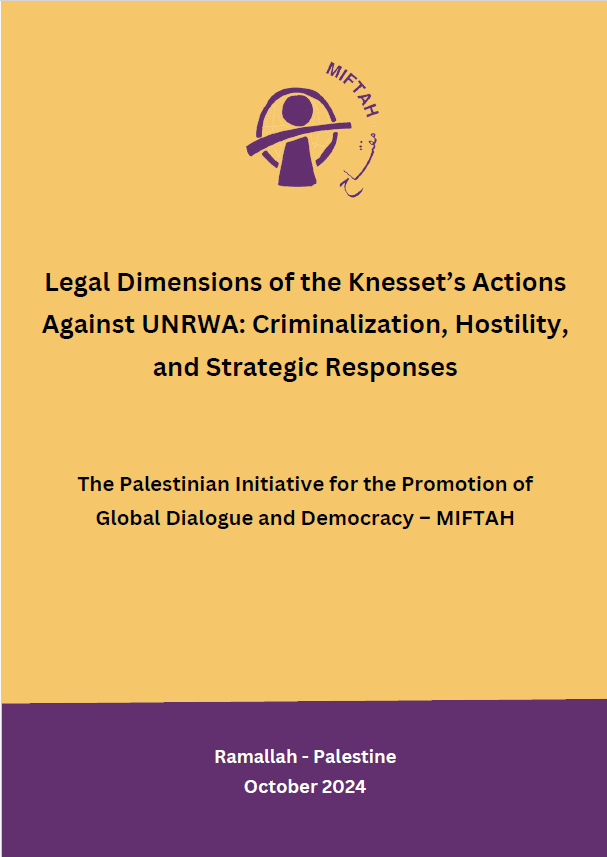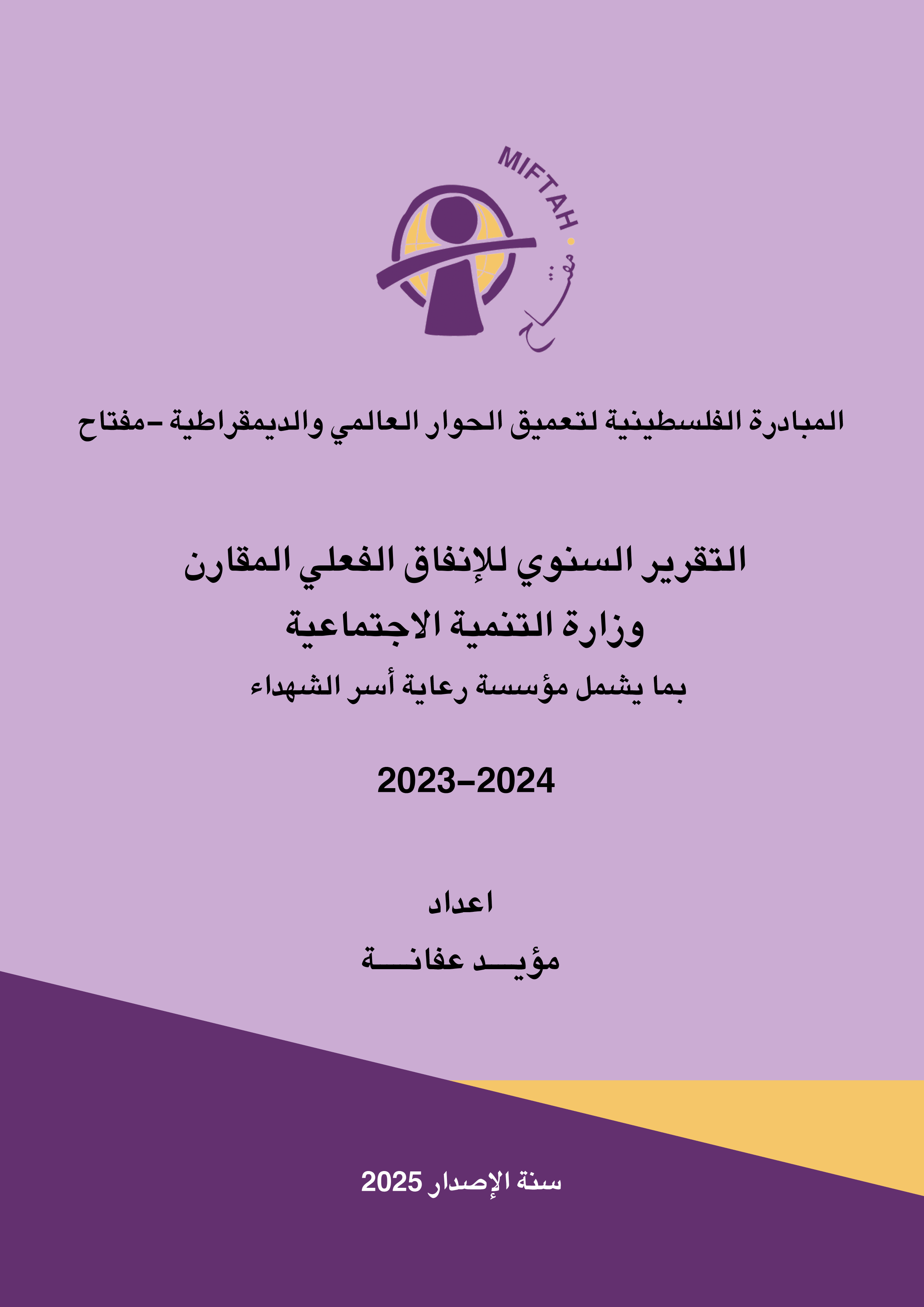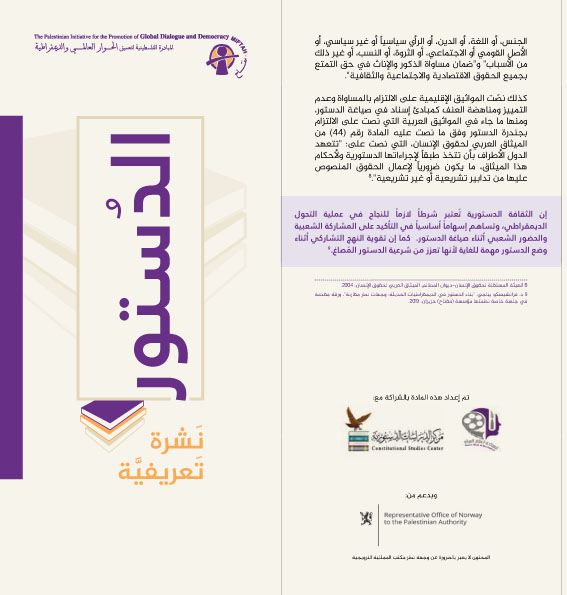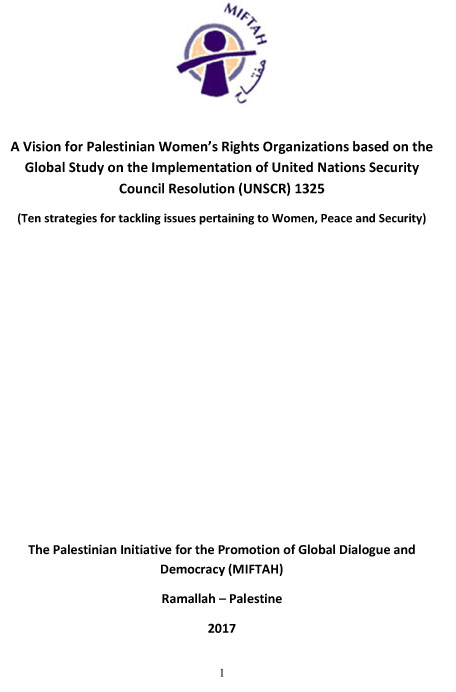The world will pay for our genocide
Date posted: July 13, 2024
By Joharah Baker
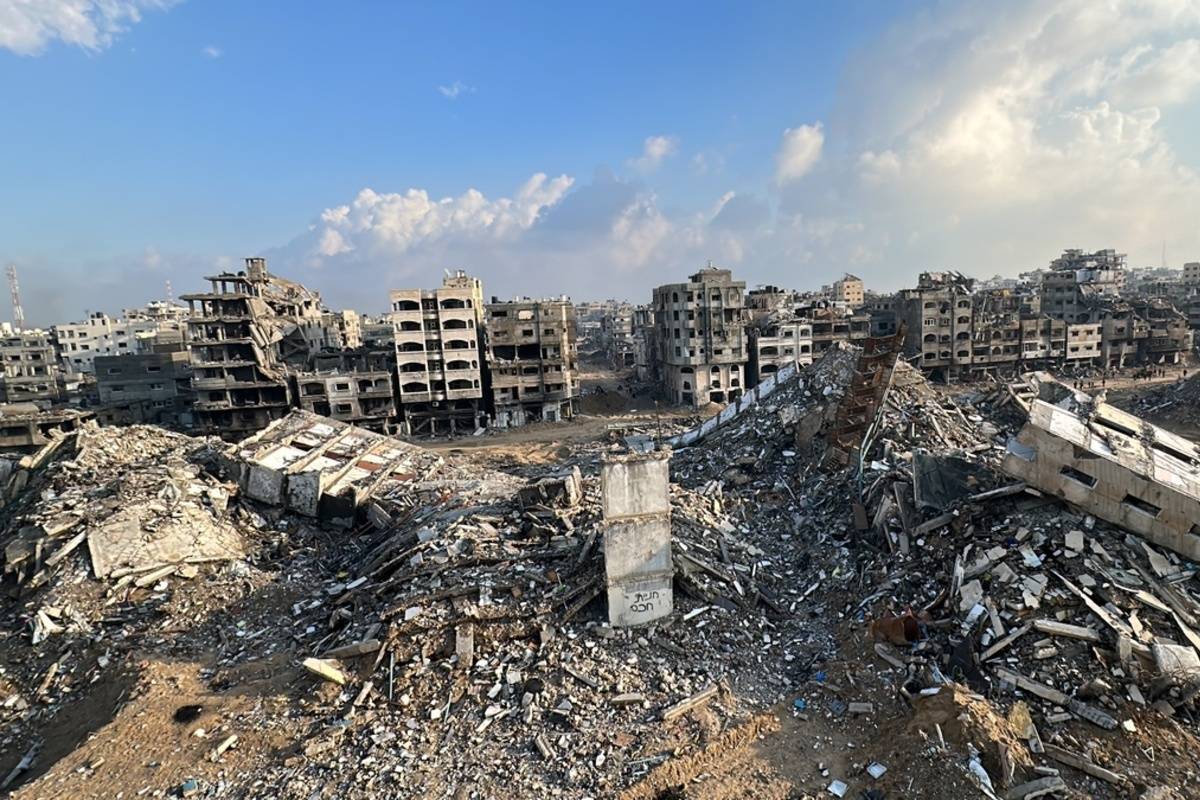
On a recent advocacy trip to Europe, I was asked by a young university student how to respond to his parents who shrug off the genocide in Gaza as something that is “unfortunately inevitable”. While this student maintained that his parents realized this was not an ideal situation, he admitted to struggling with their nonchalant attitude about the annihilation of the Palestinians. My answer was brief and to the point, albeit emotional. “Tell them: is this the kind of world you want to live in? Where a state can freely annihilate an entire people with impunity? Is this the world you want your children and grandchildren to inherit?”
The young man was well intentioned and he was clearly grappling with this existential conundrum. Jewish, he grew up in a household that believed in Israel and the Zionist project, but having witnessed what this entity and its ideology is capable of, he shifted course and is now trying to convince his parents it is their moral imperative to do the same.
Now over two months after this encounter, as Palestinians and many around the world continue to reel from the horrific scenes coming out of Gaza, this young man’s question has repeatedly crept back into my head.
In the past nine months, Israel has provided a sneak-peak into the world it envisions: one that does not question it, regardless of its atrocities; one where the word Palestine, along with its people, are wiped from map and memory. The Gaza slaughter is a foreshadowing of this new world order, which does not include us.
As the genocide grinds on mercilessly, the dead, wounded, missing and displaced soaring to unimaginable heights, a terrifying truth has dawned on us Palestinians: there is no question anymore whether the world will allow our extermination to happen or not. The answer is provided every day and with every unchecked massacre.
This world that really is callous, watching the slaughter of innocent men, women and children without blinking an eye. Or worse, they justify the rivers of Palestinian blood as “concerning” but immediately follow this up with the hackneyed phrase: “Israel has the right to defend itself,” or, “…but Hamas.” Where is the argument for the Palestinians’ right to self-defense against a brutal military occupation that has stripped them of rights and dignity for decades? Does that never calculate into the equation? Apparently not.
This is nothing new. Colonialist powers have always maligned the people under their colonization, dehumanizing them through language and deed as a means of justifying their annihilation. Indigenous peoples all over the world understand this painful reality, from New Zealand, to North and South America, to Africa and of course, Palestine. We are the “terrorists”, and the “human animals”, so our deaths will not matter.
This is where the world has it all wrong. To the parents of this young man who found his own humanity and compassion for the plight of Palestinians and was desperately seeking answers to how this compassion could be passed on to his parents, the answer is clear. The world will pay for this genocide in more ways than one, humanity being the first casualty. If “never again” signifies anything other than its literal meaning, then it means nothing at all, and this is a dangerous and slippery slope for everyone. If Israel is allowed to get away with mass murder and remain a nation among nations, who will stop Israel or others from doing this to another people ? Those who greenlighted this genocide from day one, unwittingly created a beast that will turn on them the first chance it gets.
The people united will never be divided
Date posted: April 30, 2024
By Joharah Baker
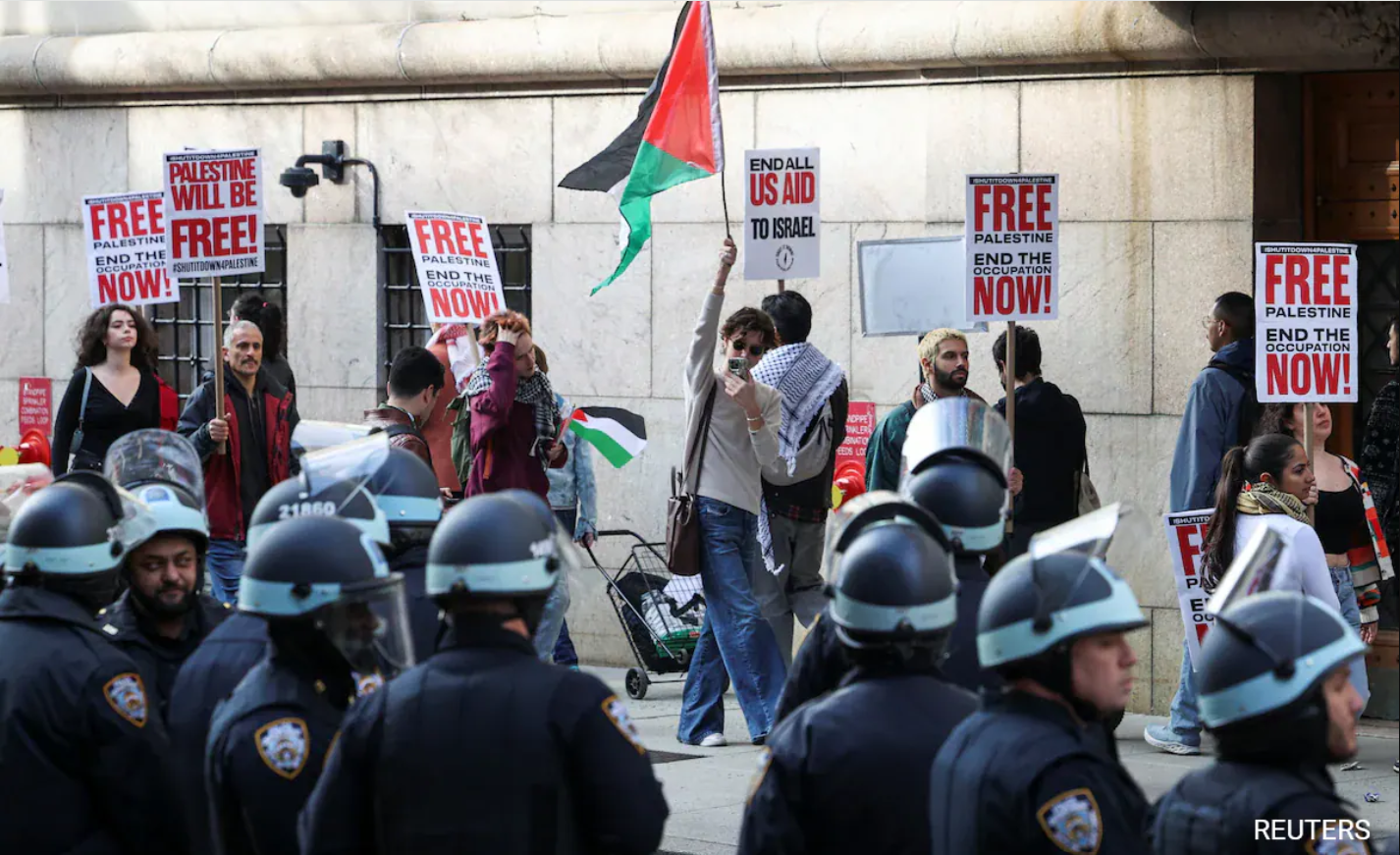
I was born in the United States and lived there through early childhood, but since returning with my family to Palestine, I have never wanted to go back. The United States has always evoked mixed feelings in me. I have a certain nostalgia for the place of my birth but my overall sentiments always culminated in a sense of resentment for this so-called superpower that has systematically aided in my people’s oppression, occupation and dehumanization.
That is, until present day. The scenes of American university campuses breaming with students in kuffiyehs, waving Palestinian flags and resisting the brutality of the police and their own university administrations, has uplifted my spirit in ways I cannot fully articulate. In a word, what is happening on US campuses today is validation of our people, of Palestine and of our struggle. To those who live comfortable lives in free countries, this may sound like an exaggeration, but for my people, who have been denied their very right to exist, who have been demoralized, demonized and dehumanized, this is huge. We are seeing students of all races, creeds, backgrounds and religions, calling for an end to the genocide in the Gaza Strip and marching for a free Palestine and divestment from the Israeli occupation. We are hearing Jewish voices, debunking Zionist propaganda and its below-the-belt attempts to conflate anti-Zionism with anti-Semitism. We are being validated for our struggle, for our resistance against oppression, occupation and settler-colonialism and we are finally being heard and seen.
Students have always been the litmus test for social and political justice. Rallies and demonstrations on university campuses have been the driving force against imperialist wars throughout the ages, the Vietnam War being the best example. However, what is so incredible about this movement is that American students are not directly involved in Palestine. Students are not being drafted into an army to fight on foreign soil, so the stakes are not as high for them at the personal level. What is happening today is the direct result of the intersectionality of struggles and the belief that no one is free until all of us are free. This is a force far more powerful than a genocidal regime will ever be.
The scenes from university campuses in the United States and now in Europe, juxtaposed against the crushing images from the Gaza Strip, are a balm for our wounded hearts. We feel a kinship with these incredible Gen Zs who have put their very lives on the line for Palestine. We send them love, energy and solidarity as we watch them being thrown to the ground, handcuffed and arrested and we burst with pride as we hear them chant ‘Free Palestine”.
This is a moment in time that must not be squandered. May these American university protests spread like wildfire throughout campuses across the world, putting to shame both Zionism and American imperialism, which has allowed this racist ideology to survive. The Palestinians have never wavered in their determination to liberate their land from Israeli occupation and oppression, whether they do it alone or with the help of friends. Today, thanks to the beautiful people all over the world who have championed our cause alongside of us, a free Palestine is not only an inevitability, it is just around the corner.
Who will hear their screams?
Date posted: April 01, 2024
By Joharah Baker for MIFTAH
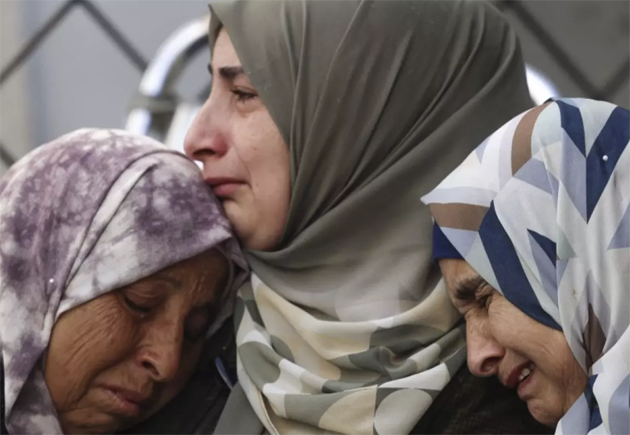
When Israel claimed women were sexually assaulted on a mass scale on October 7, the world exploded. Almost the entirety of Israel’s genocidal war was based on these and other allegations, many unsubstantiated. We all remember the infamous’40 beheaded babies” story, do we not?
This article is not about Israeli allegations per se, neither will it only focus on violations against Palestinian women. This is about a world that is immediately up in arms when one side merely alleges atrocities while it turns a blind eye to actual documented violations against the “other”.
In Gaza, it is painfully clear that we indeed, are ‘the other’. How else can anyone explain the muted cries of women being stripped, raped, starved and murdered practically in real time, on our phone screens, documented in UN reports and described in horrific detail in eyewitness testimonies? There is no other explanation than that Palestinians are what Arundhati Roy calls “Children of a lesser God”. We are the victims of deep-rooted colonialism, one whose geographic demarcations may have vanished but whose insidious, dehumanizing mentality still prevails and manifests in the ugliest of manners.
For nearly six months, Palestinians have endured unspeakable atrocities at the hands of Israel’s occupying army. Today, the Gaza Strip has been reduced to an emaciated shell of what it once was. As Gaza is being systematically decimated and ethnically cleansed, the world, for the most part, looks on. Barring sympathetic supporters and a few well-intended but timid political actors, nothing has been done to stop the carnage. Palestinians once believed there was no way the world would allow Israel to erase Gaza off the map, no way it could see a live-streamed genocide and do nothing. But that is exactly what is happening.
Then, when we thought things could not get any worse, something unfathomable emerged from the deathtrap of Gaza. When this happened, we were certain it would be the turning point in this hellish nightmare. Well-documented reports, corroborated by the UN and eyewitnesses on the ground, told of harrowing stories of sexual assault against Palestinian women in Gaza.
We were paralysed with horror when we heard of women being raped by Israeli soldiers in northern Gaza, assaulted and stripped in front of their families. What’s worse, we all know that in times like these, the undocumented atrocities will far outnumber those documented. Who knows what horrors will unfold once the dust settles in Gaza; no doubt they will be so horrific, our entire nation will be traumatized for years to come.
The real question here is not how Israel’s soldiers perpetrated such gross violations. I think by now we can all agree that this depraved military establishment and its political echelon to boot, has dehumanized and vilified Palestinians so much and for so long, they will justify just about anything. No, the question is more about the moral compass of the rest of the world. While alliances and political interests are always part of the equation, even when the issue pertains to basic human rights, nothing can better explain the blatant hypocrisy, double standards and loss of collective humanity than the deafening silence today.
Our women have not only been killed, starved and displaced, they have been exposed to the very violations that sparked global outrage and a genocidal war against an entire population under occupation, unprecedented in modern history. This is not only unacceptable, it is an indelible stain on humanity. Sexual violence is a crime so heinous it is imperative to condemn and prevent, no matter the perpetrator or the victim. That must always be the baseline in any argument.
Palestinians will never get past this genocide; it is not something you can come back from. However, be assured, this is not only about the Palestinians. The world’s women, the majority of so-called feminists who have remained disgustingly silent, must know this: when you do not stand up for women, all women, no one will stand up for you in your time of need.
A new day will come
Date posted: February 14, 2024
By Joharah Baker
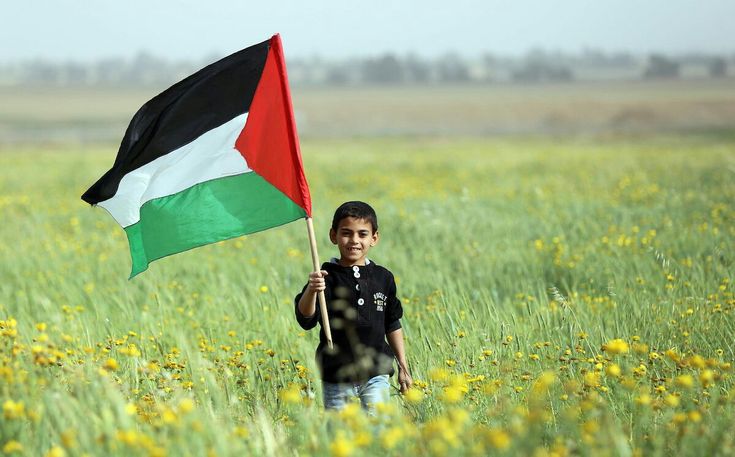
I once heard that anger is not a real emotion, but a cover for other feelings such as sadness, disappointment or fear. You need to peel back that outer layer to understand what is really going on inside.
Strange how this has lately resurfaced for me, but I think I know why. Lately, I and surely, millions of other Palestinians, have been filled with a blinding rage -- at Israel, at the United States, and at the world overall. This is a rage that is all-encompassing, the depth of which is palpable at the cellular level, permeating every molecule and every atom of our being. The genocide in the Gaza Strip has grated our emotions raw and we are left stinging and burning from our head to our toes.
Our anger is like a huge magnetosphere and we are all trapped inside, but its walls are translucent and we can see the source of our rage mocking us from beyond. We Palestinians are angry because we are so disappointed and we are angry because we are disillusioned and we are angry because we are drowning in sorrow.
Our disappointment lies in the fact that the world has failed us in the worst possible way and has allowed the unspeakable to be committed against us. Genocide is the ‘mother of all crimes’ and, contrary to the promises, the conventions and the historical lessons the world was supposed to learn, it has been committed over and over again. The Palestinian genocide, however, is unique in at least one way: it is live-streamed, which means no one can claim ignorance and everyone has a responsibility in stopping it. Hence, our disappointment is not limited to countries, Arab or otherwise, or to international and human rights organizations. It has spread to everyone in our orbit; acquaintances and people we thought were friends, but whose silence towards our slaughter is a deafening betrayal. Our sense of disappointment has discolored every relationship it touches because every relationship for us is a dichotomy: you are either with or against genocide and either support Palestine in word and deed, or not.
Our anger is a thin veil concealing our disillusion with the international community and its institutions, supposedly established to protect people in situations precisely like ours. We have confirmed what we knew all along, that these organizations were constructed for some and not all, for colonial powers and not those who suffer beneath them. Even when the highest court in the land rules in our favor, the Global North ensures that its ruling will not be implemented to save us, the oppressed, indigenous brown people whose lives apparently do not matter.
And finally, our anger is a survival mechanism to shield us from our own grief. Our sorrow over the murdered men, women and children, defenseless, homeless, starving and shivering in the cold, is so deep, so immense, we ourselves cannot fathom it. If we dare peek behind this anger and truly feel a fraction of the aching in our hearts, it will paralyze us for sure, because no people can endure the magnitude and scale of such suffering and not lose their minds.
We Palestinians know we cannot let go and that a new day is near. We know we must hold on just a little bit longer, because Palestine depends on it. We are no strangers to oppression, suffering and sacrifice and we know the price of our freedom has and continues to be painfully high. Still, we also know that a life without shackles and the yoke of oppression around our weary necks is the only life worth living.
Killing the flowers will not delay spring
Date posted: February 01, 2024
By Joharah Baker
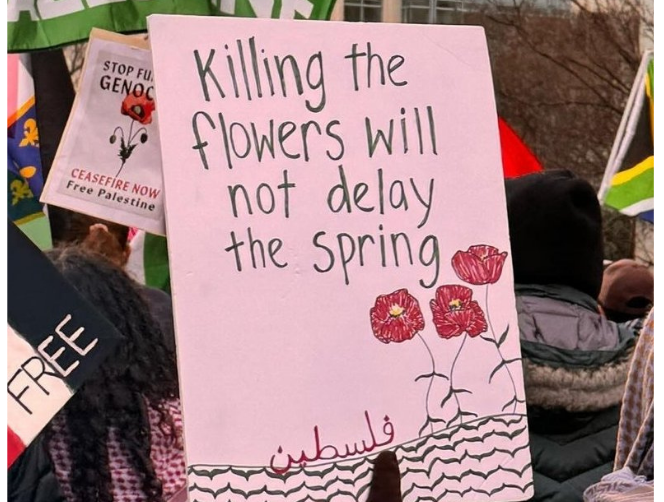
This may be the hardest article I’ve written so far, for obvious reasons. As the genocide in Gaza grinds on into its fourth month, with winter in full force, the situation is so dire it has been described as hell on earth. To date, some 27,000 Palestinians have been murdered by Israel, nearly 70% of them women and children. Another 70,000 have been wounded and at least 1.9 million people have been displaced. With only 2.3 million in the Gaza Strip to start with, this computes to 1% of its population being exterminated, and in less than four months.
However, in the midst of these horrific times, let us allow ourselves a sliver of hope. The ICJ ruling, announced on January 26, prompted mixed feelings among Palestinians who naturally, wanted to hear a clear and firm demand on Israel to stop its onslaught. However, even without the express demand for a ceasefire, the ICJ offered something to the Palestinians for which they have been demanding for many years: their suffering, their plight and the brutal oppression they live under, was finally acknowledged by the highest court in the world. More importantly, Israel is being called out for its crimes, displayed in real time for all to see. For this, we will be eternally grateful to South Africa and its exceptional legal team for bringing this case of genocide to the ICJ and forcing the world to look straight down the barrel of Israel’s cruel intentions.
Of course, for the Palestinians, we did not need an international court to tell us that Israel is committing a genocide, but it was cathartic to hear this acknowledged on a global platform. While we are aware that the actual charge of genocide perhaps needs years to prove, it only takes hearing the ruling and the case argued by South Africa to surmise that Israel is as good as convicted.
This is not insignificant, and we will cling to any shred of hope we can find in this unjust world. Having said that, this is no time to rest. If anything, it is time to push even harder because now, we have ICJ rulings in our favor and legal backing to claims we already knew were legitimate.
However, while this may have offered us some ray of light in the darkness in which we are all engulfed, the fact of the matter is that things continue to worsen on the ground in Gaza. This genocide is so heinous, not only in the brutality of the Israeli bombs and denial of basic aid to the people of Gaza, but in the fact that its people are suffering from multiple and simultaneous injustices. That is, those who are being starved are the same people who have been displaced and the same people who have been injured and cannot receive medical attention. They are the same people who have lost their homes and family members and the same people who are under the rubble. One atrocity does not cancel out another in Gaza and that is what makes this genocide so unimaginable.
We have reached a point where it is unnecessary to describe the horrors of life in Gaza because frankly, in the past four months, everyone has seen them. It is not a matter of the world not knowing. This may have been the case in other genocides and atrocities, but not this one. It really boils down to two things: The dehumanization of the Palestinians and Israel’s impunity for its crimes, the latter being a direct result of the former.
Shame on the world for accepting Israel’s vile propaganda, hook, line and sinker. Shame on the “western world” in particular, who we will never forgive. Shame on them all for aiding and abetting the slaughter of our people, their displacement, starvation and annihilation. This will not go unnoticed in the annals of history, which will paint each and every accomplice in the criminal light it deserves.
But these despicable powers do not know the lion-hearts of the Palestinians and their fierce loyalty to Palestine. They will never be able to kill us all and my hope is that this thought haunts them day and night.
A sign held up in one of the many protests around the world reads: “Killing the flowers will not delay spring”. Our Spring is coming, without a doubt.
Let’s talk about our hostages…Palestinians in Israeli prisons
Date posted: January 10, 2024
By Joharah Baker
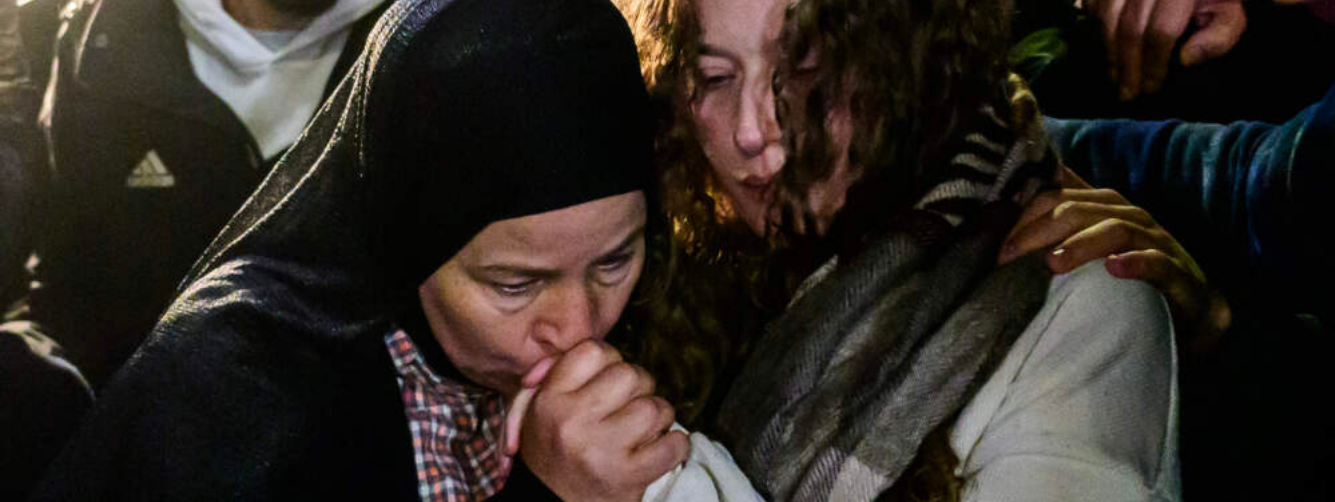
By now, we have all grown accustomed to the unabashed media bias in this genocide, particularly from western media outlets, commentators and political pundits. We no longer gasp in shock when we hear the unwavering western support for Israel, even as the latter continues to slaughter, starve and displace millions of Palestinians in the Gaza Strip. However, let us for a second, imagine that the world was fair and therefore measures its responses based on justice and rights. It is a tough assignment for sure, but maybe we can stretch our imaginations, just for a while.
Let us talk about our hostages. Yes, you read correctly, our Palestinian hostages, and there are thousands. Since terminology is key, our hostages are known as ‘prisoners’ in Israeli prisons, but in reality, they are captives, being held by an illegal system of occupation, oppression and apartheid.
I will not fully delve into the long history of Palestinian imprisonment by Israeli occupation authorities, which is a tale of mass arbitrary incarceration, torture and denial of rights. Instead, I want you to imagine this description, magnified tenfold. This is where we are today, in the midst of a genocide, while thousands of our men, women and children are being held captive in Israeli detention centers under inhumane conditions.
Since October 7, Israel has arrested over 5,700 Palestinians, over and above the nearly 3,000 already in Israel’s prisons, many from the Gaza Strip, ripped from their homes and families, their fate unknown. What’s more, over 2,000 of these detainees are held under administrative detention, without trial or charge.
The number alone should be shocking enough, but the conditions of their detention and incarceration is what will surely push you over the edge. At present, there are close to 700 known Gazans in Israel’s detention center(s), all under the amended 2002 “Unlawful Combatants Law”. This law, given Israel’s wartime state of emergency, allows it to hold “enemy fighters” for up to 75 days without seeing a lawyer or being legally processed. In other words, they are ‘disappearing’ Palestinians.
Take for example, Director of Gaza City’s Shifa Hospital, Dr. Muhammad Abu Salmiya, who was abducted from the hospital by Israeli occupation forces on November 23. His condition and whereabouts remain unknown. Gaza workers outside the Gaza Strip on October 7 were also in limbo for weeks, some of whom were arrested and kept in horrible conditions, while others found themselves stuck in the West Bank. On November 3, some 3,000 workers were released and dumped back into Gaza, without money, phones or any form of redress and showing clear signs of torture.
Other Gazans who were illegally detained and later released, along with West Bankers rounded up arbitrarily, tell of harrowing experiences. One young woman said the month she had been in prison felt more ‘like years”. She recounted how they were cursed at and beaten, how there was hardly any food and how the women were forced to sleep on the floor with no blankets or mattresses. Gazan women were held separately from West Bankers, but the detainees said they could hear their screams and pleas to find out about their children and families. Women testified they were threatened with rape, and many were sexually harassed, stripped and beaten. One woman, who will remain unnamed, said Israeli prison wardens smugly informed her that “now we are at war with you so we can do whatever we want.”
The men may have it even worse. The world saw the harrowing pictures released by the Israeli army itself, of men stripped to their underclothes, blindfolded and handcuffed, held in the cold for hours in Gaza before being hauled off to one of Israel’s infamous detention centers in the Negev desert or a military base near Beer Saba. These are run by the military, which means “no holds barred” when it comes to their treatment. Palestinian men later released, told of being kept handcuffed and blindfolded the entire duration of their incarceration, beaten if they shifted position, electrocuted and spat on. They saw no lawyer, no Red Cross representative and of course, no family.
Then there are those prisoners who did not make it at all. Since October 7, seven known Palestinian detainees, previously healthy, mysteriously died in Israeli incarceration and God only knows how many more from Gaza in particular have perished at their brutal hands.
The issue here is not that “disappearing” and brutality occurs. We all know this happens in despotic, authoritarian and tyrannical regimes. Throughout history, we have heard stories from South America, Africa and in Arab countries as well, and Palestinians are all too familiar with Israel’s brutal abuse in their prisons. What is mind-boggling is how Israel is still treated as a nation among civilized nations by the global community. How is it that a regime, which has occupied, brutalized and dehumanized an entire people for over 75 years, culminating in one of the ugliest genocides in history, is not considered a rogue state? How has it not been sanctioned, penalized and its leaders behind bars in The Hague?
That is the real question the entire world must ask itself.
In Palestine, things will never be the same
Date posted: December 21, 2023
By Joharah Baker
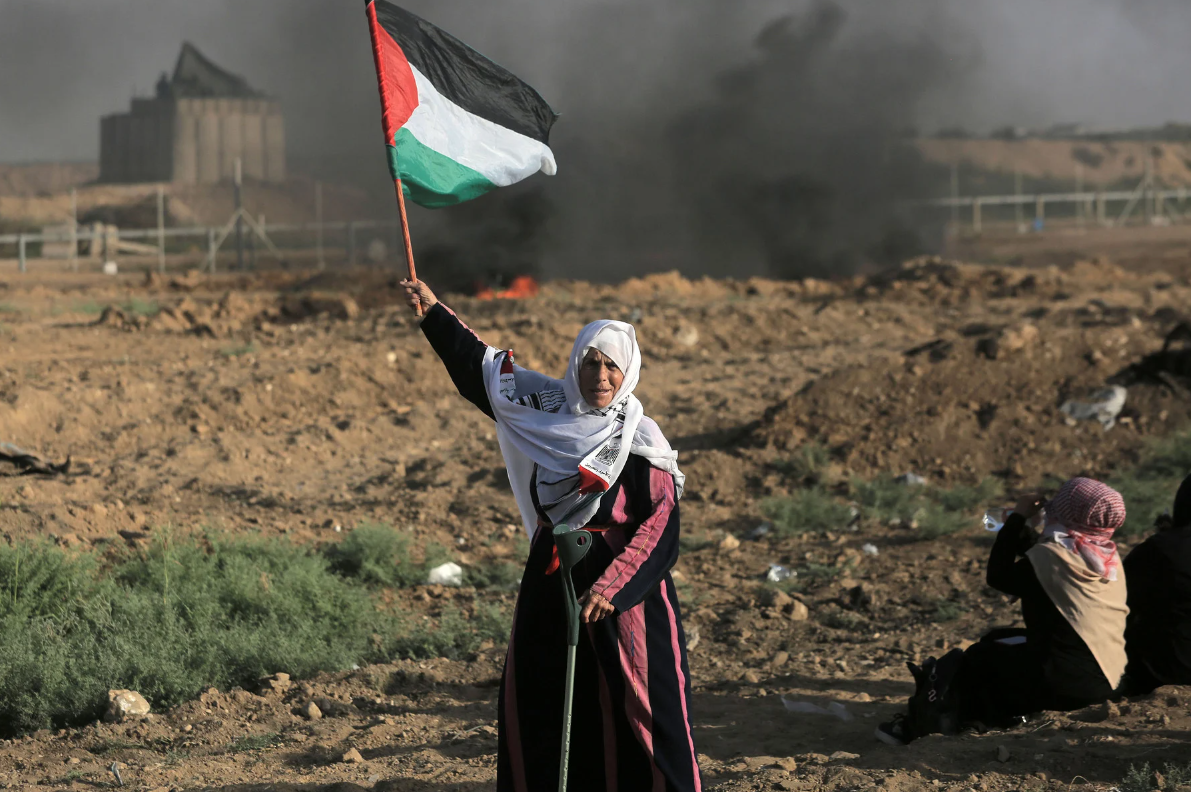
It has been over 75 days , and 75 years, since this nightmare began and in the words of one Palestinian influencer, “every day is the worst day, in Gaza.” Not only have unimaginable numbers of men, women and children been murdered by Israeli bombs, artillery shells and snipers, but new horrors emerge every day for the people who have managed to stay alive. I want to say they are the ‘lucky ones’ but I am not sure they share my sentiment. With death, destruction, displacement, disease and now starvation, surviving in Gaza means that life has been reduced to the bare minimum – finding shelter, a loaf of bread, a sip of water or an empty plot of soil to bury your loved ones.
With such unfathomable, sickening horrors, there is no turning back, primarily for Gaza but really, for all Palestinians everywhere. Regardless of whether this sadistic Israeli assault takes another day or another year to finally come to an end, we and the world, will never be the same.
This is what is called the point of no return. Palestinians will never forget the mass murder of their people in the Gaza Strip, how Israeli forces literally executed civilians in schools and on streets as they fled through “safe evacuation routes”, or how they ran over and crushed displaced persons with bulldozers. They will never forget the screams of children trapped beneath the rubble, screams that eventually went silent. They will never forget the premature babies left to die and decompose in incubators in Al Nasr Hospital after medical staff and distraught parents were forced out at gunpoint by belligerent Israeli forces. They will never forget having to bid their babies goodbye, knowing they would never see them again.
No, Palestine will never be the same and neither will the Palestinians. What has happened to this people, my people, over the past two and a half months has changed us to the very core and what may have been acceptable before is no longer acceptable now because no people on this earth can turn the other cheek to those who committed genocide against them.
The world will be forced to reckon with the new Palestinians as well. There will be checks and balances for those who aided Israel in its ethnic cleansing. Niceties are over, false pretenses of “sitting at the table to talk” will no longer apply as long as there is not a solid foundation for real justice and accountability. Palestinians will accept nothing less than for Israeli criminals to stand trial for their war crimes. They will not accept to go back to the previous status quo because if any truth has been laid bare in this genocide, it is that this status quo is completely untenable and must be cast aside for good.
The day of reckoning is near. Even through the blood and tears, Palestinians can smell the sweet fragrance of freedom. History has taught us that oppression, colonialism, apartheid and tyranny can never prevail and though the price is painfully high, justice will inevitably crack through this darkness and cast the light of emancipation on our exhausted souls. Free Palestine, now and forever.
Dear world, we see you
Date posted: November 16, 2023
By Joharah Baker for MIFTAH
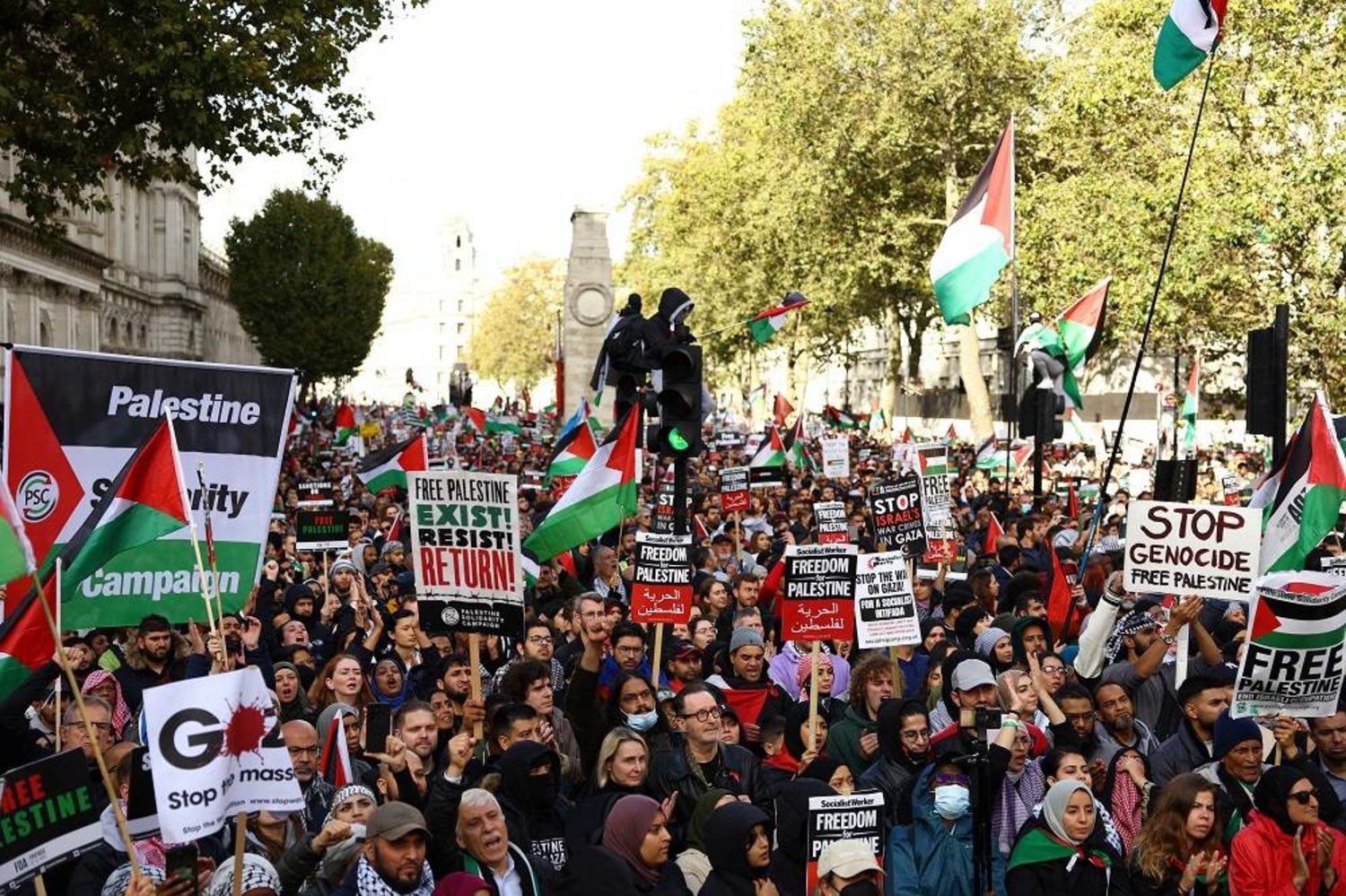
Gaza has cracked the world wide open. The masks have fallen from just about everyone and when all this is said and done, the Palestinians will take inventory on both friend and foe.
This horrendous assault on the Gaza Strip has laid bare some very uncomfortable truths. For one, the grossly unbalanced world order has not changed, even as the bombs fall mercilessly on Gaza. While our guts already knew this, it was still shocking to witness how the slaughter peeled back the layers of falsehoods, concealing the ugly truth. The world is still a binary equation of colonizer and colonized, oppressor and oppressed and white vs black and brown, and there is no question under which category the Palestinians fall.
The colonialist past is playing out in real time today in Gaza and we, as Joseph Conrad’s “Heart of Darkness” so succinctly described, are “the brutes”. We are the indigenous brown people, the sub-humans who are inherently violent and who are responsible for our own deaths.
This is also why the international and human rights organizations we erroneously banked on to do us justice, have fallen so sorely short. Now, over a month into this war on Gaza, not one country, not one international institution, including the mighty UN, has been able to force Israel’s hand. The result of course, has been devastating for Gaza. Not only have close to 12,000 innocent lives been lost in Israel’s “scorched earth” onslaught, but not one liter of fuel has been allowed into the beleaguered Strip, shutting off electricity, hospital generators, desalination plants and sewage systems. Babies have been taken out of incubators and Gazans are scrambling to find ways to desalinate seawater and building clay ovens to bake thin loaves of bread with dwindling supplies of flour.
And still, even in the bleakest of hours, we have found hope and solace in the millions who have raised their voices for us. The throngs of people marching in solidarity with Palestine in the streets of London, New York, Amsterdam, Jakarta, Sydney, and so many other cities, has been like a soothing balm for our broken hearts. We have seen journalists, celebrities and artists threatened, vilified and dehumanized in our name but who have pushed back against the intimidation and continued to speak up.
The world has split down the middle and the deep gash created by this genocide will take generations to mend. We have seen both ugly and beautiful from this world and, be assured, we will remember both.
This recurring nightmare is real
Date posted: November 08, 2023
By Joharah Baker for MIFTAH
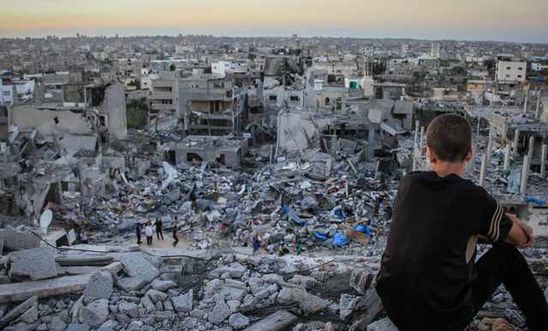
Whatever you do, do not believe them. Push back against the insidious language and the dangerous narrative Israel is employing to justify the unjustifiable: a horrendous genocide and ethnic cleansing against the Palestinians in the Gaza Strip.
Do not believe them when they say they ordered people living in the northern Gaza Strip to “evacuate” for their own safety and to move south. This is no evacuation. The people of northern Gaza are not vacating their homes because of a fire or flood. No, this part of a much deeper, much more sinister plan hatched by Israel’s leaders, not today even, but many years ago. Today, as the bombs rain down on Gaza, slaughtering everything and everyone in their path, we must be very careful to use the right words to describe this nightmare.
Make no mistake, this is a genocide. When multiple Israeli leaders, military and political, actively call for the leveling of Gaza, dismiss the murder of hundreds of thousands of civilians and even go as far as saying that dropping a nuclear bomb on Gaza is “an option”, their intentions become very clear. Hasn’t the Zionist movement always pedaled the phrase “a land without a people”?
The carpet bombing of the entire Strip is of course, the most immediate and visible manifestation of this objective. How better to get rid of an entire population than to kill them en masse? In any case, with the green light from nearly the entire western world, with the US at the helm, this has been both easily “said and done.”
However, this is not the only instrument of terror being employed against our people in Gaza. The term “evacuation” so casually being used by Israel and wholeheartedly regurgitated by the West is in fact “forced displacement”. This has nothing to do with the safety of Palestinian residents in the north, because frankly, there is nowhere safe in Gaza. Every region has been on the receiving end of the colossal bombs dropped on residential blocks, schools, mosques, churches, hospitals and shelters. Even those who still believed they could escape the bombardment were not safe as Israel bombed the displaced as they traveled on the southbound coastal road in search of refuge. Remember, Rafah and Khan Younis are in the south, both of which have been heavily bombed, killing thousands of civilians and burying hundreds of others under the rubble.
No, this Israeli scheme, being cloaked in the uncontroversial word “evacuation” is just a continuation of what the Zionist project began in 1948, which is to ethnically cleanse Palestine of its indigenous peoples. Why else would the Sinai even be on the table? And why would anyone even lend an ear to this dangerous proposal?
The reason this is still even a debatable option is because the United States and much of the western world, namely those countries with a shameful colonialist past themselves, are actively complicit in Israel’s plans. They know that whoever is pushed across the border into the Sinai, will never be allowed to return. It was not that long ago when close to a million Palestinians were forced out of their homes to escape the terror of Zionist massacres in 1948, keys in hand, which would never be used again. There are still living survivors of the Nakba, it was that recent, and yet here we are again, watching in horror as the world facilitates for a fresh, new Palestinian catastrophe.
So beware when you hear words like “evacuation” or ‘temporary refuge.” These are outright lies. Remember that 70 percent of Gazans are already refugees, expelled from their homes in 1948 during Israel’s first attempt to annihilate the Palestinians. Since they could not finish the job then, they are back now with the cruelest of intent. Israel has already surrounded and divided northern Gaza from its center and south and we have all heard Israeli voices, both official and civilian, making floor plans for ‘amusement parks and beaches’ after the Palestinians are ethnically cleansed from Gaza.
The fact is, even if the approximately one million Gazans who fled from north to south to somehow try and escape the bombs, are able to go back to their cities and camps, they will be returning to a wasteland. Their homes are probably gone, all of their belongings and memories vanished, buried deep beneath the rubble. If they are “lucky”, their memories will be the only things buried. More likely than not, members of their family are still missing, also buried under layers and layers of gray, unyielding cement.
The Palestinians have seen this horror movie before. They will not be forced out of Palestine again, even if their displacement is candy-coated with terms like ‘evacuation.” Don’t believe Israel. Don’t believe the United States. Believe us.
No more rainbows, just bold black letters written on the hands of babes
Date posted: October 25, 2023
By Joharah Baker
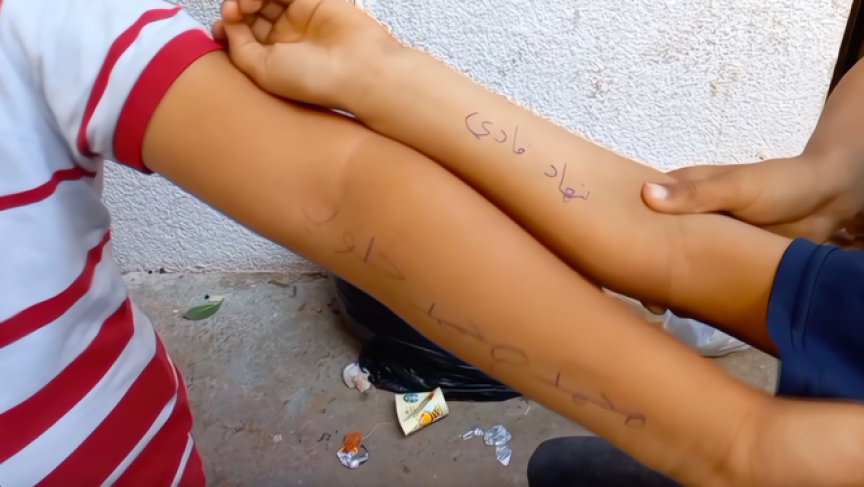
What ink is the most indelible? What color will not wash off easily? What is even stronger than waterproof ink? Because in Gaza they are looking for magic markers that will not be smeared by blood or made illegible by debris and dust. Does Gaza have enough magic markers for all of its children to write their names clearly on their bodies in the event they are blown to pieces by an Israeli bomb? Or will the trucks delivering the trickle of humanitarian aid allowed into Gaza be bringing in fresh new batches for them?
This is not a scene out of the Hunger Games or any other dystopian novel about the end of the civilized world as we know it. If it were, images of children writing their names on their bodies before they are bombed in their beds, would at least fit the script. We were horrified and fixated in equal measure as we read or watched the Hunger Games, where innocent civilians fought to escape death in the ‘arena’ of the games, with the only chance of survival being if you were the last one standing. However, we were lulled by the fact that this was fiction, the product of someone’s imagination who lived in the real world, where children are cherished and valued, their innocence protected.
The scenes today are from Gaza, the small, crowded and impoverished Palestinian Strip of horror. This is where children or their parents, are writing their names in bold black letters on their arms, their backs, their hands, so that if and when they are killed and reduced to torn and mangled flesh by an Israeli bomb, someone will know who they are.
It is beyond anyone’s worst nightmare, this war on Gaza. The word genocide is not thrown around lightly, not by Palestinians or the world at large, but this is what it is being called and rightfully so. To date, at least 6,000 Palestinians have been killed in Israel’s relentless bombardment of the Gaza Strip, thousands of whom are babies and children, day in and day out, since October 7. Its residents have had no reprieve from the bombs, no rest, no ample food, water or fuel. They are either mowed down in Israel’s killing field, or they are being starved to death and like any war, the smallest victims are the ones that weigh the most heavily on our hearts.
I am the mother of two children. They are young adults now, but will forever be the lights of my life. Today, as I watch children literally being blown to pieces, as I see them searching amongst white shrouds of death, looking desperately for their loved ones, I cannot but imagine my own son and daughter in their place. They may be young adults, but they are my babies, and I would trade in my life for theirs in a heartbeat. So, it is almost unbearable to think, even for a moment, that if fate had dealt us a different hand and we were residents of the Gaza Strip, these children writing their names on their hands could have been my own.
When you read this, don’t only conjure up an image of the children of Gaza, perhaps too foreign or too ‘brown’ for you. We are all acutely aware of the process of dehumanization that Palestinians have been subjected to by the colonialist west and of course, by Israel. So instead, conjure up an image of your own children, as horrible as that may sound, having to scribble their names on their hands as they watch their world exploding around them.
Maybe only then, will the enormity and the horror of what has befallen Gaza, dawn on you. Our children have become Israel’s easiest targets and it is slaughtering them with chilling ease.
The malevolent forces at work, busy annihilating my people, will not stop out of mercy or compassion, even for the thousands of slain children. It will take a power, even stronger than this killing machine to force their hand. Let us remember, “President Snow” from the Hunger Games was only defeated when the Mockingjay’s righteous army of people brought him down.
14 Emil Touma Street,
Al Massayef, Ramallah
Postalcode P6058131
P.O.Box 69647
Jerusalem
972-2-298 9490/1
972-2-298 9492
info@miftah.org






